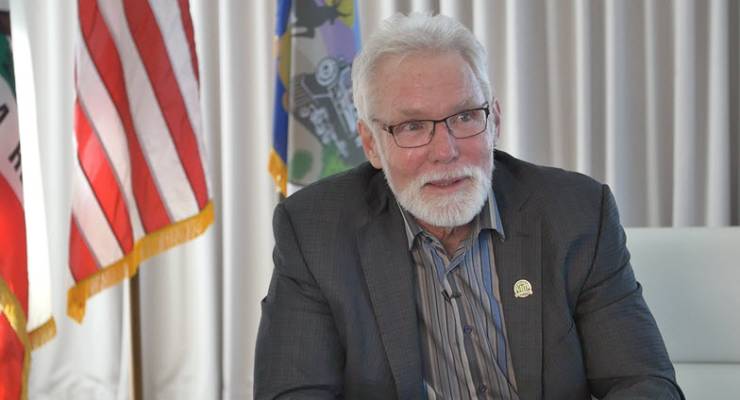
Lancaster Mayor Rex Parris. Photo credit: Ben VanderVeen/Climate Council Australia.
For R. Rex Parris, the militantly renewables-focussed mayor of Lancaster, California, ushering in the green business revolution calls for the same approach to lowering the city’s crime rate: “You just gotta be a little dictator to do it.”
With this, Parris drops the first hint that he might not be giving us the whole story behind Lancaster, a city roughly 100 kilometers north of Los Angeles. The interview has until now centred on the mayor’s journey as both Republican and renewables advocate, but, for a few seconds, we’ve veered into his rise to power, and what turns out to be a much murkier example of his aggressive attitude towards public safety.
Parris is a radical conservative; someone you would absolutely want with a climate change portfolio but kept as far as humanly possibly away from social services. He has done everything in his power to turn Lancaster into the world’s first net-zero city, from instituting a publicly-owned renewable energy program, to nearly doubling California’s discount on electric vehicles, to giving sustainable businesses, effectively, whatever they want.
The story of a Republican mayor doggedly pursuing the title for first zero-net energy city, where it produces more sustainable energy than it consumes, has attracted national and international attention. It is a conservative stance that might be unimaginable at the federal US level, but is not of unheard of in California, where former Republican Governor Arnold Schwarzenegger introduced the state’s bipartisan cap-and-trade bill in 2006.
“Just because I’m a Republican doesn’t mean I’m stupid,” Parris says. “And too often those two are equated, now more than ever.”
“[I’m a Republican] because I believe in public safety before anything else. If you truly believe in that, there aren’t any options here.”
Parris, a silver-haired, wild-eyed man of 65, hasn’t always felt this way.
A defense attorney who self-funded his first election campaign, Parris openly admits that until being elected midway through construction on a solar power plant in Lancaster, eSolar’s Sierra SunTower, he fully bought into the Republican lie that climate change was “a Chinese plot [designed for] a competitive advantage”.
The plant, which created energy by reflecting solar radiation at a boiler, turned out to be too expensive to run on all but the sunniest of days. While it resulted in just 12.9% of the expected energy and ended commercial operations in 2013, it worked as an experiment in renewable commercialisation, a lightning rod for short-term employment, and a way forward for Lancaster.
More importantly for Parris, the plant came with the realisation “that the biggest impediment to [climate action] is government, not because of malicious conduct but because of benign neglect.” He describes how, when faced with interstate regulations that would have killed the project before it began, he did what any conservative politician should do: demolished bureaucratic hurdles for renewables, the cheapest new source of energy.
This mentality was put to action when state regulations saw the SunTower boiler project delayed. “It was going to be a week before they got permits,” Parris says. “[But] we have people who could call the Governor, we called the Governor, and an hour later…”
The next step in Parris’ relationship with renewable businesses, and complimenting his borderline-Darwinist obsession with China, came during a chance Los Angeles County meeting with BYD (“Build Your Dreams”), a Chinese electric vehicle and energy storage manufacturer, in early 2010.
BYD had been operating in China for seven years and were then scouting US opportunities. While other towns courted their investment, Parris went above and beyond in fostering a partnership, including demolishing local regulations, organising multiple delegations to the company’s Shenzhen headquarters, and printing bilingual business cards, a small, uncommon example of intercultural respect.
With the ultimate goal of wooing BYD’s manufacturing arm, Parris first paired the company with a US homebuilder, KB Homes, in order to build one of America’s first affordable net-zero houses. The city also introduced BYD to the owner of a local, struggling RV factory they could repurpose, and pledged a gift of 13 acres of surrounding land for a second site if the company hired 200 local workers in its first three years.
All this paid off on May 1, 2013, when BYD opened its first North American electric bus manufacturing plant and battery storage facility in Lancaster. The factory now makes 300 electric buses a year and has created 650 direct jobs; with the launch of the second, neighbouring factory scheduled for 2018, this is set to jump to 1,000 buses a year and 1,500 direct employees.
It’s an incredible leap from an under-producing solar-station. Parris has brought a green revolution to Lancaster, but will the city, and Parris himself, come out the other side?
Tomorrow: The green revolution begins in Lancaster, and not everyone is happy about it, in part two of our story.
*The reporter travelled to California with the Climate Council Australia.








“More importantly for Parris, the plant came with the realization ‘that the biggest impediment to [climate change] is government; not because of malicious conduct but because of benign neglect.”
Fifty percent correct and . . . fifty percent incorrect.
Credit where, and if, it is due.
No chance at all of carpetbaggers & scam artists flocking to a deregulated enclave. Never happens.